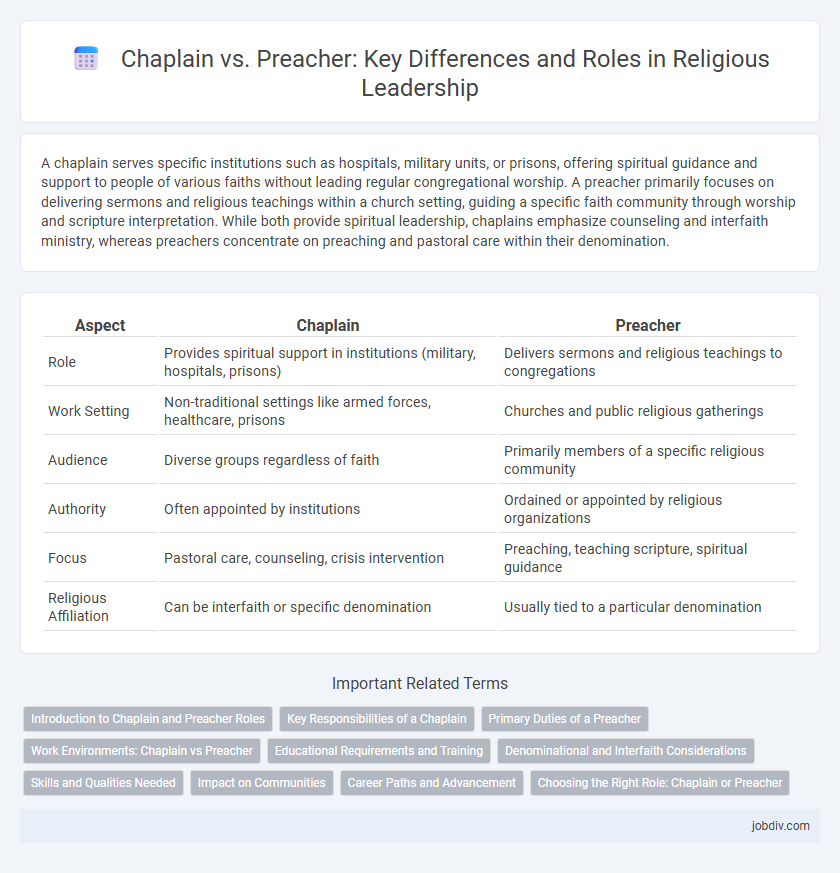A chaplain serves specific institutions such as hospitals, military units, or prisons, offering spiritual guidance and support to people of various faiths without leading regular congregational worship. A preacher primarily focuses on delivering sermons and religious teachings within a church setting, guiding a specific faith community through worship and scripture interpretation. While both provide spiritual leadership, chaplains emphasize counseling and interfaith ministry, whereas preachers concentrate on preaching and pastoral care within their denomination.
Table of Comparison
| Aspect | Chaplain | Preacher |
|---|---|---|
| Role | Provides spiritual support in institutions (military, hospitals, prisons) | Delivers sermons and religious teachings to congregations |
| Work Setting | Non-traditional settings like armed forces, healthcare, prisons | Churches and public religious gatherings |
| Audience | Diverse groups regardless of faith | Primarily members of a specific religious community |
| Authority | Often appointed by institutions | Ordained or appointed by religious organizations |
| Focus | Pastoral care, counseling, crisis intervention | Preaching, teaching scripture, spiritual guidance |
| Religious Affiliation | Can be interfaith or specific denomination | Usually tied to a particular denomination |
Introduction to Chaplain and Preacher Roles
A chaplain serves as a spiritual guide and counselor within institutions such as hospitals, military units, prisons, and universities, providing religious support to diverse groups regardless of denomination. A preacher primarily focuses on delivering sermons and religious teachings within a church or congregation to promote spiritual growth and faith understanding. Both roles emphasize spiritual care, but chaplains operate in secular settings while preachers minister directly to worship communities.
Key Responsibilities of a Chaplain
A chaplain provides spiritual support and guidance within institutional settings such as hospitals, military units, or prisons, focusing on counseling individuals during crises. They perform religious services, coordinate with multidisciplinary teams, and ensure inclusive care for diverse faiths. Chaplains often address emotional and ethical concerns, emphasizing holistic well-being and crisis intervention.
Primary Duties of a Preacher
A preacher primarily delivers sermons to inspire and instruct congregations, emphasizing the interpretation and proclamation of scripture to nurture faith and spiritual growth. Their role involves teaching biblical principles, evangelizing, and providing moral guidance within religious services. Unlike chaplains who serve diverse institutional settings, preachers focus on leading worship and fostering community within a specific church or religious congregation.
Work Environments: Chaplain vs Preacher
Chaplains typically serve in diverse institutional settings such as hospitals, military bases, prisons, and universities, providing spiritual support tailored to individuals from various faith traditions. Preachers primarily work within church communities, delivering sermons and leading worship services focused on their specific religious denomination. The chaplain's role demands adaptability to secular environments, while preachers engage deeply with congregational leadership and religious instruction.
Educational Requirements and Training
Chaplains typically require formal theological education, often holding a master's degree in divinity or religious studies, combined with specialized training in pastoral care and counseling to serve diverse institutional settings like hospitals, prisons, or the military. Preachers usually need training in theology or ministry, which can range from formal seminary degrees to ordination within their specific religious denomination, focusing on sermon preparation and delivery. Both roles demand a deep understanding of scripture and doctrinal knowledge, but chaplains emphasize interdisciplinary skills for crisis intervention and spiritual support across varied faiths.
Denominational and Interfaith Considerations
Chaplains serve diverse religious and secular settings, offering spiritual care across multiple denominations and faith traditions, emphasizing interfaith inclusivity and counseling. Preachers typically represent a specific denomination, focusing on delivering sermons aligned with their church's doctrine and guiding congregational worship. Denominational identity significantly shapes a preacher's message, while chaplains prioritize broad spiritual support regardless of religious affiliation.
Skills and Qualities Needed
Chaplains require strong interpersonal skills, empathy, and the ability to provide spiritual care across diverse faiths and situations, often within institutional settings such as hospitals or the military. Preachers need excellent public speaking abilities, deep theological knowledge, and the talent to inspire and educate congregations through sermons grounded in scripture. Both roles demand emotional resilience, cultural sensitivity, and a commitment to serving the spiritual and moral needs of their communities.
Impact on Communities
Chaplains provide spiritual care and emotional support in diverse settings like hospitals, military, and prisons, fostering inclusivity and healing across varied communities. Preachers primarily lead congregational worship and deliver sermons aimed at teaching doctrine and inspiring faith within specific religious groups. The impact of chaplains lies in personalized, situational ministry, while preachers influence community identity and collective religious experience.
Career Paths and Advancement
Chaplains often serve in institutional settings such as hospitals, military, or prisons, with career advancement linked to specialized training and certifications in counseling or crisis intervention. Preachers typically progress within church hierarchies, where advancement depends on theological education, pastoral experience, and congregational leadership skills. Both roles require strong communication abilities, but chaplains may advance through interdisciplinary collaboration, while preachers focus on growing their congregation and denominational influence.
Choosing the Right Role: Chaplain or Preacher
Choosing between a chaplain and a preacher depends on the context and audience, as chaplains often serve in institutional settings like hospitals, military, or prisons providing spiritual care across diverse faiths, while preachers typically focus on delivering sermons within a specific religious congregation. Chaplains emphasize counseling, crisis intervention, and interfaith support, whereas preachers concentrate on teaching doctrine, evangelism, and community leadership. Understanding the distinct functions and environments helps individuals align their calling with either pastoral care in secular settings or religious instruction in church communities.
Chaplain vs Preacher Infographic

 jobdiv.com
jobdiv.com